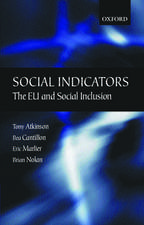The Theory of Multi-level Governance: Conceptual, Empirical, and Normative Challenges
Autor Simona Piattonien Limba Engleză Hardback – 25 feb 2010
Preț: 790.44 lei
Preț vechi: 1135.34 lei
-30% Nou
Puncte Express: 1186
Preț estimativ în valută:
151.26€ • 158.64$ • 125.91£
151.26€ • 158.64$ • 125.91£
Carte tipărită la comandă
Livrare economică 21-27 martie
Preluare comenzi: 021 569.72.76
Specificații
ISBN-13: 9780199562923
ISBN-10: 019956292X
Pagini: 316
Dimensiuni: 164 x 241 x 23 mm
Greutate: 0.64 kg
Editura: OUP OXFORD
Colecția OUP Oxford
Locul publicării:Oxford, United Kingdom
ISBN-10: 019956292X
Pagini: 316
Dimensiuni: 164 x 241 x 23 mm
Greutate: 0.64 kg
Editura: OUP OXFORD
Colecția OUP Oxford
Locul publicării:Oxford, United Kingdom
Recenzii
Simona Piattoni's book offers an exceptional innovative insight for the development of theorising multi-level governance ... The highlight of this book is the development of a multidimensional framework of analysis of multi-level governance theorisation. This makes it an innovative and valuable contribution to the further completion of multi-level governance theory. To capture the distinctiveness of multi-level governance in simultaneously theoretical, empirical and normative terms, the author uses an ambitious yet successful approach. Hence, it deserves more attention and should provoke serious debate and further research in this field.
Notă biografică
Simona Piattoni is Associate Professor of Political Science at the University of Trento, Italy, where she teaches Comparative Politics, European Politics and Local Government. She previously taught at the University of Tromsø (Norway) and has been visiting scholars at the European University Institute, the Max-Planck Institut für Gesellschaftsforschung, and the University of California, Berkeley. She is member of the Executive Committee of the European Consortium for Political Research (ECPR), and the Conference Group on Italian Politics and Society (CONGRIPS) and sits on the editorial boards of the European Journal of Political Research, Regional and Federal Studies, European Political Studies, Rivista Italiana di Scienza Politica, and Meridiana. Her main research interests concern European Union governance and particularistic politics (clientelism, corruption).












